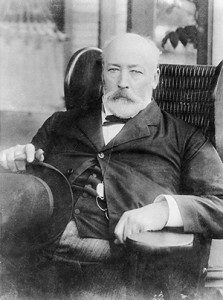Inducted 1999
William van Horne was born on February 3, 1843 in Illinois. At the age of 14 William began working to help support his family. This was the start of his career with railways. In 1857 he left school to work as a telegrapher with the Illinois Central Railway. In 1864, he started a new job as train dispatcher in Bloomington, Illinois. He was married a few years later to Lucy Hurd, the daughter of a civil engineer involved in railway construction.
He worked as superintendent of transportation on the Chicago & Alton Railway. At age 29 he became the youngest railroad head through his appointment as general superintendent of the Illinois Central Railway. In 1881 Van Horne was asked to be the general manager of the Canadian Pacific Railway (CP.) He was under contract to build the transcontinental line that would connect British Columbia with the eastern part of the country. He began his job in January, 1882 and completed it 3 years later in 1885 when the last spike was driven.
Prior to the beginning of construction, Van Horne explored and surveyed the area. Starting at Winnipeg they built west, covering 2 or 3 miles a day. The builders were required to overcome difficult sections created by the 600 miles of mountains as well as the north shore of Lake Superior which was a wilderness of granite. Van Horne worked himself harder than his crews, arranging steamship service to distribute material and supplies, seeing to the opening of stone quarries and three dynamite factories.
By 1883, there were 1,552 miles of CP mainline and branches built. It was Van Horne who picked a new site for the western Terminus and named it Vancouver. He managed to continue the building of the railway when there was no money left for payment. He himself went without pay for months. Directors used their personal fortunes, businessmen advanced credit and supplies and construction forces went without pay.
In 1888 William Van Horne was named President of the Canadian Pacific railway and later became Chairman of the Board. He resigned from CP in 1899.
In 1894, he was also awarded a knighthood for his achievements with the railway. Van Horne purchased the southern tip of Minister’s Island near St. Andrews and spent the last 25 years of his life there. Sir William Cornelius Van Horne died on September 11, 1915 in Montreal and was buried in his hometown of Joliet, Illinois.


